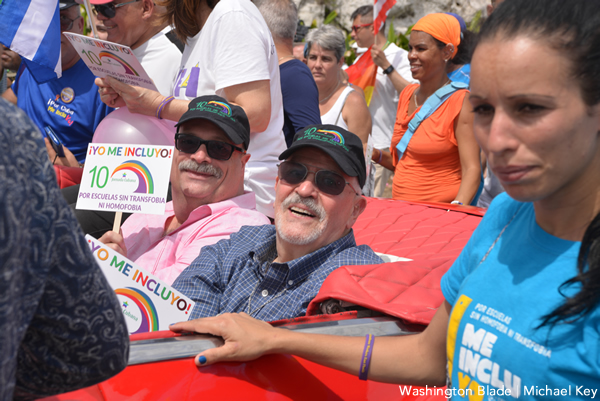Opinions
Trump’s Cuba directive is an unfortunate step backwards
Policy only bolsters government at expense of Cuban people
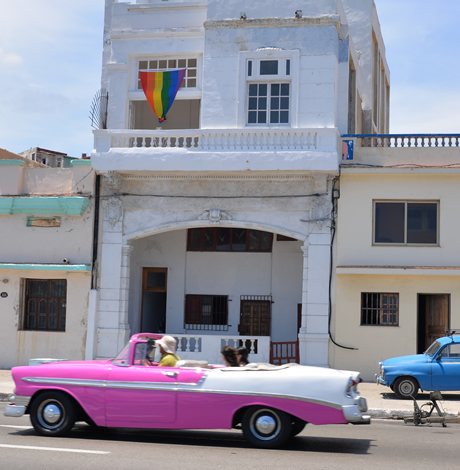
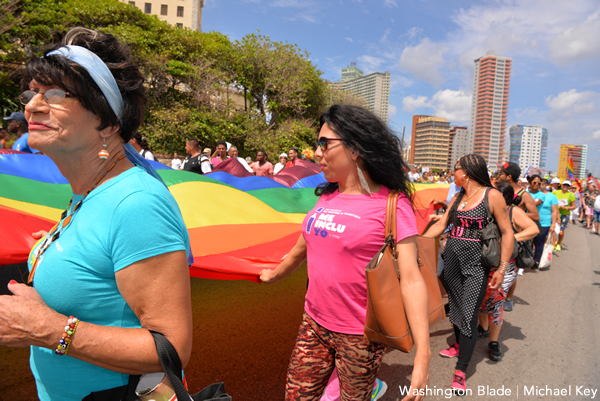
A transgender woman takes part in a march in Havana on May 13, 2017, that commemorated the International Day Against Homophobia and Transphobia. President Trump this month reinstated travel and trade restrictions with Cuba. (Washington Blade photo by Michael Key)
The Centro Comunitario de Cultura, an LGBT community center, is located in the backyard of Victor Manuel Dueñas, an activist who is among those behind a campaign that urges Cuban lawmakers to discuss whether to extend marriage rights to same-sex couples. Dueñas, his partner and several other independent Cuban advocates last month met with Gender Rights Maryland Executive Director Dana Beyer and other U.S. activists in Havana. A homemade centerpiece with the Cuban and U.S. flags was on a table in Dueñas’ backyard on May 16 when I attended his group’s International Day Against Homophobia and Transphobia commemoration.
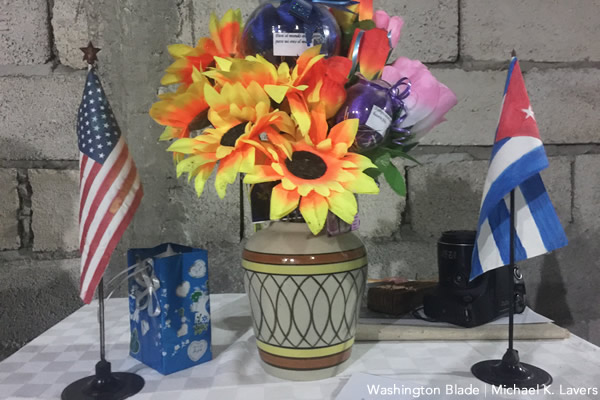
The U.S. and Cuban flags at the Centro Comunitario de Cultura in Santo Domingo, Cuba, on May 16, 2017. (Washington Blade photo by Michael K. Lavers)
The Miami Herald last month reported more than 600,000 Americans visited Cuba in 2016, even though U.S. citizens cannot legally travel to the Communist island for tourism-related purposes. The directive that Trump announced in Miami on June 16 prevents U.S. citizens from spending money at hotels, restaurants and other entities the Cuban military owns.
The new policy requires Americans who travel to Cuba — which is less than 100 miles south of the Florida Keys — to “keep full and accurate records of all transactions related to authorized travel” for at least five years. It also allows the Treasury Department to audit them.
Trump’s directive — which chips away at the normalization of relations between the U.S. and Cuba that then-President Obama announced in 2014 — does not close the U.S. Embassy in Havana and allows American airlines and cruise ship companies to continue serving the Communist island. American citizens are still allowed to bring Cuban rum and cigars back to the U.S.
This new policy is nothing short of insanity.
Trump in no position to lecture Cuba on human rights
Trump framed his directive — which he announced surrounded by Cuban exiles who voted for him — against the backdrop of Cuba’s human rights record.
Independent LGBT rights advocates note the crackdown against them has increased since the U.S. normalized relations with Cuba. They also insist the Cuban government has grown more paranoid since 2014.
Security agents arrested Maykel González, an independent journalist and activist, last October and detained him for three days while reporting on the aftermath of Hurricane Matthew in the city of Baracoa. Authorities last month prevented Cuban Foundation for LGBTI Rights President Nelson Gandulla, who is a vocal critic of Mariela Castro, the daughter of Cuban President Raúl Castro who spearheads LGBT-specific issues as director of the country’s National Center for Sexual Education, from traveling to Havana in order to meet with Beyer and her U.S. counterparts. The Cuban government likely placed me under surveillance because I spoke with Gandulla and interviewed him at his home in the city of Cienfuegos on May 16.
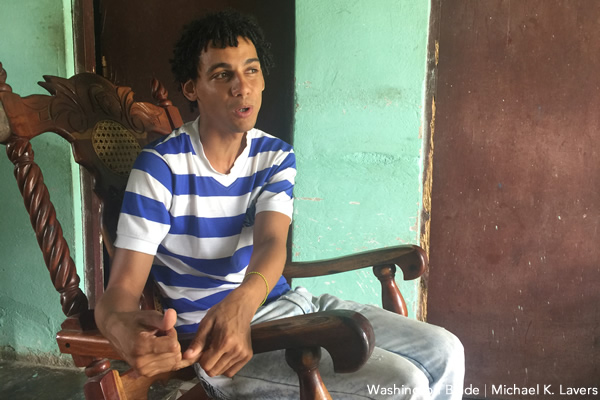
Cuban Foundation for LGBTI Rights President Nelson Gandulla speaks exclusively to the Washington Blade at his home in Cienfuegos, Cuba, on May 16, 2017. (Washington Blade photo by Michael K. Lavers)
Trump last month traveled to Saudi Arabia, which, among other things, imposes the death penalty upon those who are found guilty of consensual same-sex sexual relations, and signed an agreement that includes a $110 billion defense deal. He has also praised Philippine President Rodrigo Duterte’s crackdown on drugs that has left thousands of people dead.
Russian President Vladimir Putin — who Trump has repeatedly applauded in spite of the Kremlin’s efforts to interfere with last year’s presidential election — has continued to target critics of his country’s government, independent journalists and LGBT rights advocates, among others. Trump has yet to publicly criticize the crackdown against gay men in Chechnya.
Media reports that emerged last fall indicate Trump’s company and four of his associates violated the U.S. embargo against Cuba in 1998 and in late 2012 or early 2013.
Hatred of Cuban government should not define U.S. policy
One can feel sympathy towards Cuban Americans and their families who felt they had no choice but to flee their homeland after the 1959 revolution that brought Fidel Castro to power. One can also feel sympathy towards exiles in Miami who are victims of human rights abuses the Castros perpetuated against them. Hatred and resentment of their homeland’s government — which one can categorize as the manifestation of a bitter family feud that has gone on for nearly six decades — has no place in U.S. foreign policy and should not be used as justification to explicitly prohibit Americans from traveling to the island.
The Cuban people deserve much better from their own government and from the U.S. Trump’s directive not only harms them, but bolsters the very government that it publicly seeks to punish. This insane new policy is an unfortunate step backwards.
Opinions
Community comes together to repair WorldPride history exhibition
Vandals damaged pictures, timeline walls on June 22

Earlier this month, vandals shouting homophobic slurs damaged the 8-foot hero cubes and timeline walls of the Rainbow History Project’s (RHP) WorldPride exhibition “Pickets, Protests, and Parades: The History of Gay Pride in Washington.” The week’s incident was the fifth homophobic attack on the exhibition chronicling DC’s LGBTQ+ History, the vandalism damage was only made worse by the storms this past week.
In response, RHP posted a call online for volunteers and donations and over a dozen volunteers showed up on Saturday to repair the exhibition in its final stretch.
It took three hours, but the group assembled during a heat advisory to bend the fences back into place, fix the cubes and zip tie all the materials together to keep them safe. Some of those who came out to volunteer, Slatt said, were known RHP volunteers but most were total strangers who had attended an event here or there or just wanted to get involved for the first time, one was even in D.C. as an out-of-town guest and after seeing the Instagram call, decided to spend their day lifting some heavy fencing back into place.
When asked why they showed up, volunteer Abbey said: “especially during Pride month, it’s so important to come together as a community, not just to celebrate, but to support each other. To know that this historic exhibit is even able to exist right now under this administration is really amazing. The fact that we’re just able to help continue it in its last leg of being out here is really important.”
“Rainbow History Project does a lot of work for the community,” another volunteer Ellie said, “they show up in a lot of ways that I think we really need right now, so in terms of being asked to come out and do a couple hours of lifting, that is something that we can easily support and do.”
“We put out a call asking for support from the community, and so we didn’t know what we’d get,” Slatt continued, “but strangers have shown up. We were upset, we were crying. We were trying to come up with a battle plan and more and more people have shown up with open arms and empty hands to do this. It’s 95 degrees, we are melting in the heat. It’s just amazing the number of people who have come here.”
If anything, the anonymous exhibit designer said, the people who vandalized the exhibit made the community stronger and mobilized members passionate about preserving and sharing our histories. Their efforts backfired in a big way — bringing together people who had only attended one or two RHP events or had read about the organization online to actively contribute to the work.
It’s a meaningful representation of the history of D.C.’s LGBTQ+ community, one that often starts with a small group of people who come together to protest but soon mobilize their communities and enact monumental change in the nation’s capital.
“If Pride in D.C. started with 10 people picketing the White House,” Slatt remarked, “you just got 12 more to join the gay history movement.”
This was especially poignant, another volunteer Mattie said, on the week that the Supreme Court issued a decision allowing Tennessee to ban puberty blockers and hormone therapy for minors seeking gender affirming care. It was a devastating moment for the LGBTQ+ community who mobilized once more in front of the Supreme Court this past Friday.
“It’s been actually really important to see this community come together in the face of direct attack on our history in the wake of direct attacks on our rights,” Mattie said, “and we stand up to that. We come together, and we represent. That is so important to maintaining our strength and our community throughout trying times now and ahead.”
When asked about how community members can support RHP’s work and repair the damage long-term to the exhibit, Slatt urged people to donate to RHP, to volunteer as exhibit monitors, and to come visit the exhibit.
“We’ve been doing this for 25 years. This is our 25th anniversary, and if it weren’t for volunteers donating their time and their talents, if it weren’t for small dollar donors, we would never have gotten anything done,” Slatt said. “I’d say to anyone out there that we are on this plaza all through Independence weekend, we are here through the Smithsonian Folklife Festival, people can come on down.”
Slatt and other volunteers will be leading tours each evening at 7 p.m. at Freedom Plaza, and people can pre-order the exhibition catalog right now, which will be delivered in time for LGBTQ+ History Month in October.
Emma Cieslik is a D.C.-based museum worker and public historian.

Independence Day, commonly known as the Fourth of July, is a federal holiday commemorating the ratification of the Declaration of Independence by the Second Continental Congress on July 4, 1776, establishing the United States of America. The delegates of the Second Continental Congress declared the 13 colonies are no longer subject (and subordinate) to the monarch of Britain, King George III and were now united, free, and independent states. The Congress voted to approve independence by passing the Lee resolution on July 2, and adopted the Declaration of Independence two days later, on July 4.
Today we have a felon in the White House, who wants to be a king, and doesn’t know what the Declaration of Independence means. Each day we see more erosion of what our country has fought to stand for over the years. We began with a country run by white men, where slavery was accepted, and where women weren’t included in our constitution, or allowed to vote. We have come far, and next year will celebrate 250 years. Slowly, but surely, we have moved forward. That is until Nov. 5, 2024, when the nation elected the felon who now sits in the Oval Office.
There are some who say they didn’t know what he would do when they voted for him. They are the ones who were either fooled, believing his lies, or just weren’t smart enough to read the blueprint which laid out what he would do, Project 2025. It is there for everyone to see. There should be no surprise at what he is doing to the country, and the world. Last Friday his Supreme Court, and yes, it is his, the three people he had confirmed in his first term, gave him permission to be the king he wants to be. The kind of king our Declaration of Independence said we were renouncing. A man who with the stroke of a pen can ruin thousands of lives, and change the course of America’s future. A man who has set back our country by decades, in just a few months.
So, I understand why many are suggesting there is nothing to celebrate this Fourth of July. How do we have parties, and fireworks, celebrating the 249th year of our independence when so many are being sidelined and harmed by the felon and his MAGA sycophants in the Congress, and on the Supreme Court. Yes, there are those celebrating all he is doing. Those who want to pretend transgender people don’t exist, and put their lives in danger; those who think it’s alright to take away a women’s right to control her body, and her healthcare; those who think parents should be able to interfere on a daily basis with their children’s schooling and wipe out the existence of gay people for them. Those who pretend there was a mandate in the last election, when it was only won by about 1 percent. Those who think disparaging veterans, firing them, and taking away their healthcare, is ok. Those in the LGBTQ community like Log Cabin Republicans, who think supporting a racist, sexist, homophobe is the right thing to do.
So, what do we, as decent caring people, do this Fourth of July. What do we say to those who are being harmed as we celebrate. What do we say to those trans people, those women, those immigrants who came here to escape their own dictators, and are now finding they have come to a country with its own would-be dictator. I say to them, please don’t give up on America. Don’t give up on the possibility decent loving people in our country will finally wake up and say, “enough.” That the majority of Americans will remember we fought a revolution to escape a king, and we fought a civil war to end slavery. That we moved forward and gave women the right to vote, and gave the LGBTQ community the right to marry. Don’t give up on the people that did all that, and think they won’t rise up again, and tell the felon, racist, homophobe, misogynist, found liable for sexual assault, now in the White House, and his sycophants in congress, and his cult, that we will take back our country in the 2026 midterm elections. That we will vote in large numbers, and demand our freedom from the tyranny that he is foisting on our country.
So yes, I will celebrate this Fourth of July not for what is happening in our country today, but rather for what our country actually stands for. Not for birthday parades, and abandonment of the heroes in Ukraine in support of dictators like Putin. But for the belief the decent people in our country will rise up and vote. That is what I will celebrate and pray for this Fourth of July. That is what I think the fireworks will mean this July Fourth. I refuse to accept defeat the same way our revolutionary soldiers wouldn’t, and the way our troops in the civil war wouldn’t till the confederacy was defeated.
I will celebrate this Fourth of July because I refuse to accept we will not defeat those who would destroy our beautiful country, and what it really stands for.
Peter Rosenstein is a longtime LGBTQ rights and Democratic Party activist.
Opinions
Is it time for DC to have new congressional representation?
Del. Eleanor Holmes Norton will turn 89 in June

With WorldPride, Supreme Court decisions, military parades in our streets, mayor and City Council discussions about a new football stadium, it is entirely understandable if we missed the real local political story for our future in the halls of Congress. Starting this past May, the whispered longtime discussions about the city’s representation in Congress broke out. Stories in Mother Jones, Reddit, Politico, Axios, NBC News, the New York Times, and even the Washington Post have raised the question of time for a change after so many years. A little background for those who may not be longtime residents is definitely necessary.
Since the passage of the 1973 District of Columbia Home Rule Act, we District residents have had only two people represent us in Congress, Walter Fauntroy and Eleanor Holmes Norton, who was first elected in 1990 after Mr. Fauntroy decided to run for mayor of our nation’s capital city.
No one can deny Mrs. Norton’s love and devotion for the District. Without the right to vote for legislation except in committee, she has labored hard and often times very loud to protect us from congressional interference and has successfully passed District of Columbia statehood twice in the House of Representatives, only to see the efforts fail in the U.S. Senate where our representation is nonexistent.
However, the question must be asked: Is it time for a new person to accept the challenges of working with fellow Democrats and even with Republicans who look for any opportunity to harm our city? Let us remember that the GOP House stripped away millions of OUR dollars from the D.C. budget, trashed needle exchange programs, attacked reproductive freedoms, interfered with our gun laws at a moment’s notice, and recently have even proposed returning the District to Maryland, which does not want us, or simply abolishing the mayor and City Council and returning to the old days of three commissioners or the very silly proposal to change the name of our Metro system to honor you know you.
Mrs. Norton will be 89 years old next year around the time of the June 2026 primary and advising us she is running for another two-year term. Besides her position there will be other major elected city positions to vote for, namely mayor, several City Council members and Board of Education, the district attorney and the ANC. Voting for a change must not be taken as an insult to her. It should be raised and praised as an immense thank you from our LGBTQ+ community to Mrs. Norton for her many years of service not only as our voice in Congress but must include her chairing the Equal Employment Opportunity Commission, her time at the ACLU, teaching constitutional law at Georgetown University Law School, and her role in the 1963 March on Washington.
Personally, I am hoping she will accept all the accolades which will come her way. Her service can continue by becoming the mentor/tutor to her replacement. It is time!
John Klenert is a longtime D.C. resident and member of the DC Vote and LGBTQ+ Victory Fund Campaign boards of directors.

